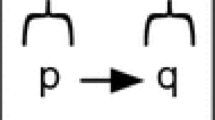Abstract
Boolean games are a logical setting for representing static games in a succinct way, taking advantage of the expressive power and conciseness of propositional logic. A Boolean game consists of a set of players, each of them controls a set of propositional variables and has a specific goal expressed by a propositional formula. There is a lot of graphical structures hidden in a Boolean game: the satisfaction of each player’s goal depends on players whose actions have an influence on these goals. Even if these dependencies are not specific to Boolean games, in this particular setting they give a way of finding simple characterizations of Nash equilibria and computing them.
Access this chapter
Tax calculation will be finalised at checkout
Purchases are for personal use only
Preview
Unable to display preview. Download preview PDF.
Similar content being viewed by others
References
Harrenstein, P., van der Hoek, W., Meyer, J., Witteveen, C.: Boolean Games. In: Proc. of TARK 2001, pp. 287–298. Morgan Kaufmann, San Francisco (2001)
Harrenstein, P.: Logic in Conflict. PhD thesis, Utrecht University (2004)
Dunne, P., van der Hoek, W.: Representation and Complexity in Boolean Games. In: Alferes, J.J., Leite, J. (eds.) JELIA 2004. LNCS (LNAI), vol. 3229, pp. 347–359. Springer, Heidelberg (2004)
Bonzon, E., Lagasquie-Schiex, M., Lang, J., Zanuttini, B.: Boolean games revisited. In: Proc. of ECAI 2006, pp. 265–269. Springer, Heidelberg (2006)
Bonzon, E., Lagasquie-Schiex, M., Lang, J.: Compact preference representation for Boolean games. In: Yang, Q., Webb, G. (eds.) PRICAI 2006. LNCS (LNAI), vol. 4099, pp. 41–50. Springer, Heidelberg (2006)
Koller, D., Milch, B.: Multi-Agent Influence Diagrams for Representing and Solving Games. Games and Economic Behavior 45(1), 181–221 (2003)
Kearns, M., Littman, M.L., Singh, S.: Graphical Models for Game Theory. In: Procs. of UAI 2001 (2001)
Gottlob, G., Greco, G., Scarcello, F.: Pure Nash Equilibria: Hard and Easy Games. Journal of Artificial Intelligence Research 24, 357–406 (2005)
Lang, J., Liberatore, P., Marquis, P.: Propositional Independence - Formula-Variable Independence and Forgetting. Journal of Artificial Intelligence Research 18, 391–443 (2003)
Osborne, M., Rubinstein, A.: A course in game theory. MIT Press, Cambridge (1994)
Boutilier, C., Brafman, R., Hoos, H., Poole, D.: Reasoning with Conditional Ceteris Paribus Preference Statements. In: Proc. of UAI 1999 (1999)
Besnard, P., Lang, J., Marquis, P.: Variable Forgetting in Preference Relations over Propositional Domains. In: Proc. of ECAI 2006, pp. 763–764. Springer, Heidelberg (2006)
Dubois, D., Lang, J., Prade, H.: Inconsistency in possibilistic knowledge bases: To live with it or not live with it. In: Fuzzy Logic for theManagement of Uncertainty, pp. 335–351 (1992)
Benferhat, S., Cayrol, C., Dubois, D., Lang, J., Prade, H.: Inconsistency management and prioritized syntax-based entailment. In: Proc. of IJCAI 1993, pp. 640–645 (1993)
Lehmann, D.: Another Perspective on Default Reasoning. Annals of Mathematics and Artificial Intelligence 15, 61–82 (1995)
Wooldridge, M., Dunne, P.: On the computational complexity of qualitative coalitional games. Artificial Intelligence (2004)
Dunne, P., Wooldridge, M.: Preferences in Qualitative Coalitional Games. In: Proc. of GTDT 2004, pp. 29–38 (2004)
Mura, P.L.: Game Networks. In: Procs. of UAI 2000, pp. 335–342 (2000)
Sichman, J., Conte, R.: Multi-Agent Dependence by Dependence Graphs. In: Alonso, E., Kudenko, D., Kazakov, D. (eds.) AAMAS 2000 and AAMAS 2002. LNCS (LNAI), vol. 2636. Springer, Heidelberg (2003)
Boella, G., Sauro, L., van der Torre, L.: From Social Power to Social Importance. Web Intelligence and Agent Systems Journal (to appear)
Boella, G., Sauro, L., van der Torre, L.: Admissible agreements among goal-directed agents. In: Proc. of IAT 2005 (2005)
Chevaleyre, Y., Endriss, U., Lang, J.: Expressive Power ofWeighted Propositional Formulas for Cardinal Preference Modelling. In: Proc. of KR 2006, pp. 145–152. AAAI Press, Stanford (2006)
Author information
Authors and Affiliations
Editor information
Editors and Affiliations
Rights and permissions
Copyright information
© 2007 Springer-Verlag Berlin Heidelberg
About this paper
Cite this paper
Bonzon, E., Lagasquie-Schiex, MC., Lang, J. (2007). Dependencies Between Players in Boolean Games. In: Mellouli, K. (eds) Symbolic and Quantitative Approaches to Reasoning with Uncertainty. ECSQARU 2007. Lecture Notes in Computer Science(), vol 4724. Springer, Berlin, Heidelberg. https://doi.org/10.1007/978-3-540-75256-1_65
Download citation
DOI: https://doi.org/10.1007/978-3-540-75256-1_65
Publisher Name: Springer, Berlin, Heidelberg
Print ISBN: 978-3-540-75255-4
Online ISBN: 978-3-540-75256-1
eBook Packages: Computer ScienceComputer Science (R0)




